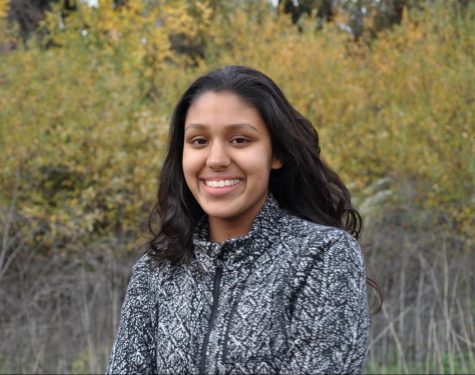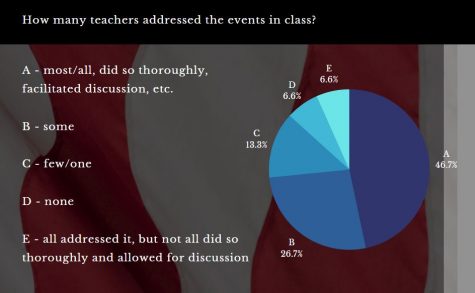DHS Reacts: Anonymous thoughts on the Jan. 6th Capitol riots
Courtesy of the Dublin Political Coalition, Dublin High Students shared their anonymous thoughts on the January 6th riots at the Capitol and explained how the event was discussed through online school. Some responses edited for grammar or brevity.
On January 6th, a mob that had originally met at a protest rally held by President Trump marched to the Capitol building where Senators would be certifying the November 6th election results. They fought their way through security, leaving destruction in their path. Though generally unorganized, they agreed that they did not accept the election results and wanted Mr. Trump to be given a second term in office. As senators fled for their safety, much of the country was left in shock at the siege, showing an event that had not happened since the 19th century in the United States.
Students were passionate about what they saw on Wednesday, shocked by the destruction and chaos in the government they had learned to revere since elementary school field trips and social studies lessons.
“Demonstrates to the world how unprepared the Capitol security is and how easily it can be breached. Physically threat[ens] national security, reminiscent of how the White House was stormed by British troops in 1812.”
“The situation in the Capitol shows a gross negligence to a prominent threat to democracy.”
Other students kept their responses short and blunt:
“Shocking.”
“Extremely deplorable.”
“Disgusting.”
Another directly blamed “Trump’s dangerous rhetoric” from the four years of his presidency.
“Over the presidency, [Trump] has pushed an “us vs them” mentality onto his followers, in turn demonizing any opposition. In essence, he created an echo-chamber. Now, when I ask myself “how did it get this bad,” I remember that Trump has been priming his base, through every conference, rally, and tweet. As a result, many of Trump’s supporters, so isolated in their own false perception of reality, took pride in the breach, believing their acts were righteous and patriotic.”
“One thing that is important to note is how now that Biden is president you won’t see people wearing hats and waving flags with his name on it like you do the MAGA party. It’s ABSURD that people have made liking Trump their personality trait.”
Many students noted hypocritical reactions to the Jan. 6th riots in comparison to other recent outbursts of political violence associated with minority groups and/or the Black Lives Matter demonstrations that took place across the country this summer.
“Another important thing to note is how minority groups are label[ed] and stereotyped all the time for actions few people in their minority group have done, but now that white people have committed an act of terrorism and insurrection you won’t see ANY stereotyping or generalizations made about them. That right the[re] just shows the perfect example of white privilege. It is just embarrassing that’s it. If this had happened anywhere else in the world the United States would have disowned that country and their people as radicals, especially if it had happened in a developed country.”
“I think it’s extremely deplorable and really sad. The actions conducted by the police and protestors show the massive injustice in this country. If the question of, what if the protestors were black? or hispanic? or any minority? ever crossed your mind, then it shows that there are deep problems that still exist in this country.”
“[The event was] very bad; white privilege is real.”
“It was basically a coup and an embarrassment to democracy. I think that the difference in treatment between the BLM protesters and those raiding the capitol yesterday was not okay. Paraphrased from a quote my teacher saw and shared with us: BLM protestors aren’t saying to shoot yesterday’s ‘protestors’ like they shot BLM; they’re saying to not shoot BLM, showing the same leniency yesterday’s ‘protestors’ got.”
One student mourned the inevitability of January 6th’s events.
“I think it was almost inevitable. People were getting angrier and angrier and without anyone to lower the temperature it was going to explode at some point.”
Others had lessons to share and more positive hopes for the future.
“I think what we can learn from this experience is that, in the end, we all have a choice. When things don’t go our way, your reaction/the choices you make really comes down to your maturity. My thing is, breaking into the Capitol does not show anything but your disrespect towards our country and it’s democracy.”
“I am disgusted and frustrated by the violence and the president’s seditious behavior. Many have been saying that this shows American democracy is weak and fragile. However, I think it is actually a testament to the strength of our Constitution that we are able to withstand these attacks and still certify fair elections.”
Ultimately, students were also appreciative of their teachers, who changed lessons plans and facilitated conversations for students to go over the events. Though many noted that humanities and social studies teachers were the main examples, most students felt that a majority of their teachers addressed the crisis. Some did note, however, that administration did little, leaving much of the handling to individual teachers.
Your donation will support the student journalists of Dublin High School. Your contribution will allow us to purchase equipment and cover our annual website hosting costs.

Ananya Varshneya is a senior at Dublin High and a columnist for the Shield. Her column, "Notes on Notes", discusses current events, culture, and media...




































